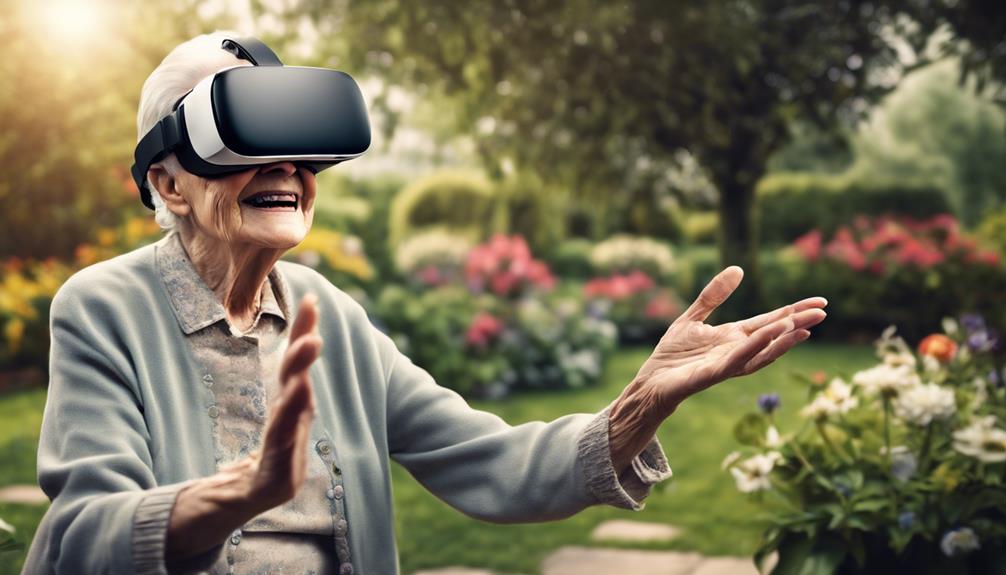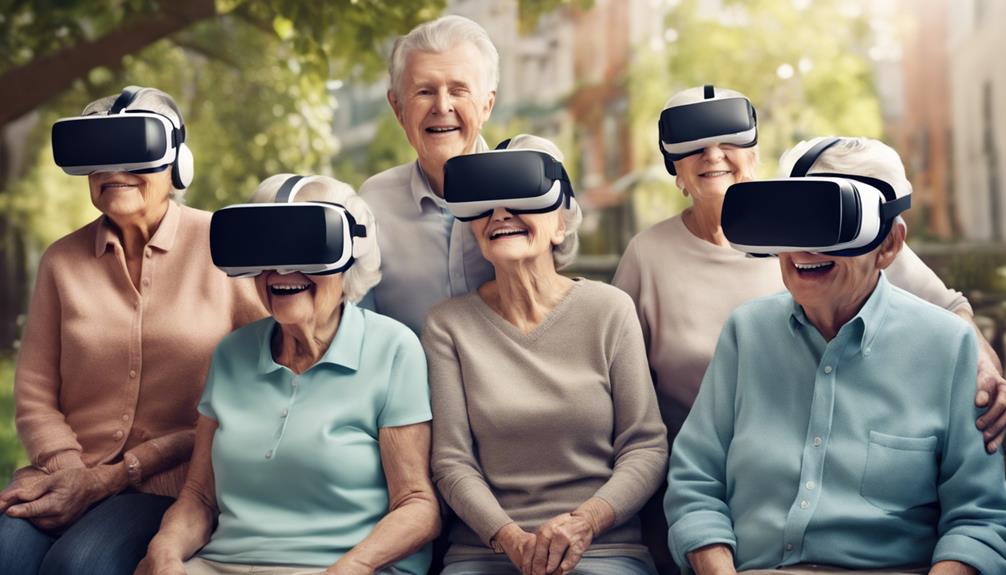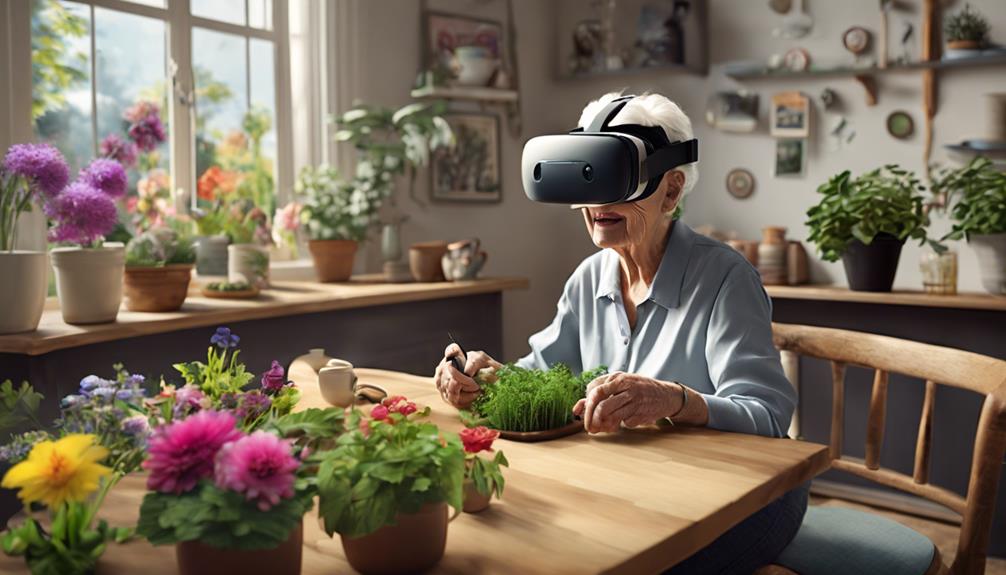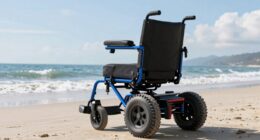In the field of elderly care, virtual reality is seen as a vital tool that provides many advantages for seniors. Picture a world where new possibilities arise, chances for interaction appear, and connections thrive in ways that have yet to be fully understood.
As we navigate through the landscape of VR possibilities for seniors, we uncover a realm of untapped potential that promises to revolutionize the way we perceive aging and well-being.
Join us as we delve into the transformative power of VR technology in enhancing the lives of our beloved seniors, reshaping the future of senior care one virtual experience at a time.
Key Takeaways
- VR reduces social isolation, loneliness
- Tailored experiences improve cognitive function
- Integration in communities enhances mental stimulation
- Promising future applications for senior care
Benefits of VR for Seniors
By reducing social isolation and loneliness, virtual reality technology offers seniors a pathway to improved mental health and overall well-being. Seniors benefit from engaging in immersive VR experiences that not only entertain but also challenge their cognitive function, helping to strengthen neural connections and keep their minds sharp.
Through virtual reality, older adults can enjoy a heightened quality of life by participating in stimulating activities that enhance their overall well-being.
Moreover, virtual reality provides a platform for social engagement, allowing seniors to interact with others and form connections that are vital for their mental health. By integrating VR technology into senior living communities, residents can access specialized therapy sessions, cognitive exercises, and social interactions that combat feelings of isolation and promote a sense of community and belonging.
These benefits of VR for seniors go beyond mere entertainment, providing a holistic approach to improving their mental health and quality of life.
VR Experiences for Older Adults

How can virtual reality enhance the lives of older adults through tailored experiences and interactive engagement? Virtual reality experiences for older adults offer a wide range of benefits that cater to their cognitive health, combat social isolation, and provide immersive environments that stimulate the mind. By providing personalized experiences and challenging activities, VR can strengthen neural connectors in older adults, contributing to improved cognitive function. Apps like Wander and National Geographic VR allow seniors to virtually explore different destinations, while fitness apps like Zen Zone offer tailored wellness activities. Social connection apps such as Alcove help alleviate feelings of loneliness through virtual interactions. Below is a table highlighting some virtual reality experiences specifically designed for older adults:
| Virtual Reality Experiences | Benefits |
|---|---|
| Travel and Exploration Apps | Virtual visits to different destinations |
| Fitness and Wellness Apps | Relaxation experiences and fitness activities |
| Social Connection Apps | Combat social isolation and loneliness through virtual interactions |
Through these immersive and engaging experiences, virtual reality technology can positively impact the lives of older adults, promoting mental stimulation and social connections.
Mental Health Benefits of VR
Virtual reality technology has emerged as a transformative tool for improving the mental health and well-being of older adults, offering immersive experiences that combat social isolation and enhance cognitive function. Studies have shown that VR experiences can reduce social isolation and loneliness in seniors, contributing to their overall mental well-being. Moreover, VR technology has been found to improve cognitive function and memory retention in older adults, providing them with engaging mental stimulation.
One of the significant benefits of VR for seniors is its ability to alleviate symptoms of depression and anxiety. VR therapy offers immersive environments that stimulate cognitive abilities and promote emotional health, enhancing psychological well-being. By engaging in VR interventions, seniors can experience an improvement in their quality of life, as these technologies offer a unique way to address mental health challenges. Overall, the use of virtual reality in enhancing the mental health of older adults showcases the potential for innovative approaches to support their well-being.
VR in Senior Living Communities

Enhancing social engagement and mental stimulation for older adults, virtual reality technology in senior living communities revolutionizes the way residents experience daily life. By reducing feelings of social isolation and loneliness, VR in senior living communities plays a crucial role in enhancing cognitive health and overall well-being. The personalized experiences offered through VR activities not only improve daily activities but also serve as a form of therapy for residents. Through these immersive experiences, seniors can connect with others, explore new places, and engage in stimulating mental exercises that promote brain function.
Moreover, VR integration in senior living facilities fosters social connections among residents, creating a sense of community and belonging. These virtual reality experiences go beyond mere entertainment; they contribute significantly to the residents' quality of life by providing a novel way to stay mentally active and socially connected. As we continue to explore the possibilities of VR in senior living communities, we aim to further enhance the lives of older adults through innovative and impactful technologies.
Clinical Research and VR's Future
In our exploration of clinical research and the future of virtual reality for seniors, ongoing studies conducted by companies like MyndVR play a crucial role in uncovering the benefits of this technology. Collaboration with university and private-sector researchers is enhancing our understanding of VR's impact on age-related conditions. Scientific studies demonstrate promising results for VR in improving cognitive health and well-being in older adults. This emerging technology trend is shaping the future of VR applications in senior care, with the potential to significantly enhance cognitive health and overall well-being in seniors.
| Benefits of VR for Seniors | Impact |
|---|---|
| Improved cognitive health | Enhances memory and mental acuity |
| Boosted well-being | Reduces feelings of isolation and depression |
| Addressing age-related conditions | Provides therapeutic interventions and support |
Through rigorous clinical research and ongoing scientific studies, we are paving the way for future applications of VR that focus on enhancing seniors' lives in profound ways.
Frequently Asked Questions
How Virtual Reality Is Benefiting Seniors?
Virtual reality is benefiting seniors in various ways, including enhancing their cognitive abilities, reducing loneliness, and fostering social connections.
It provides immersive experiences that stimulate the mind and offer a sense of companionship.
VR technology has been proven to improve the quality of life for older adults, offering opportunities for mental health enhancement and social interaction.
Seniors are finding solace and joy in the engaging and interactive environments that virtual reality offers.
What Is the Best VR for Seniors?
When it comes to choosing the best VR headset for seniors, we recommend considering factors like:
- Comfort
- Display resolution
- Compatibility with smartphones
The right headset can enhance their quality of life through immersive experiences.
How Does Virtual Reality Benefit People?
Virtual reality benefits people by offering immersive experiences that enhance various aspects of life, such as reducing stress, boosting creativity, and increasing empathy.
VR technology transports individuals to new worlds, providing unique opportunities for growth and entertainment.
It can also serve as a powerful tool for education and therapy, making learning and healing more engaging and effective.
The potential applications of virtual reality are vast and continue to expand across different fields.
Is VR Good for Dementia?
Yes, VR is good for dementia. It has shown promise in improving cognitive function and psychological health in patients.
Reminiscence therapy through VR can help recall memories and create positive experiences.
VR activities challenge the mind and enhance neural connectivity, improving overall well-being for seniors with dementia.
Studies suggest VR can have similar benefits to other sensory therapies in dementia care.
Can Virtual Reality Help Older Adults Stay Active and Engaged?
Virtual reality offers a variety of engaging activities for older adults, helping them stay active and engaged. These immersive experiences can include virtual travel, interactive games, and simulated activities that promote physical and mental stimulation. It’s a fun way for seniors to stay connected and maintain a healthy lifestyle.
Conclusion
In conclusion, virtual reality seniors soar beyond solitude, sparking social connections, sharpening minds, and soothing souls.
With VR, older adults can escape into enriching experiences that enhance their well-being and quality of life.
The future of clinical research holds promising possibilities for integrating VR into senior living communities, unlocking the transformative benefits for our beloved seniors.
Let's embrace the boundless potential of VR to bring joy, connection, and vitality to our aging population.









